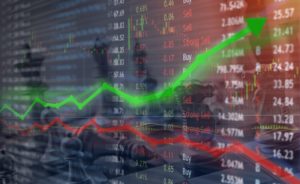Rising Interest Rates, Market Turmoil Encourage a Self-Reliant Retirement
While a volatile stock market is often referred to as a roller coaster ride, the closing days of 2018 seemed to have been the next step up.
After a prolonged growth period, the market moved into a new record-setting path of volatility. And some financial pundits suggest that it may continue in the new year. Welcome to the new reality of 2019.
The week before Christmas, the Dow notched its worst weekly loss in a decade. This was followed by a Christmas Eve drop that was the worst on that date in the stock market’s history. These precipitous declines propelled the market to the edge of a bear market, which is considered a 20% decline from the market’s most recent high point.
Then, the Dow whiplashed to climb by 1,000 points. This was the highest one-day point gain ever. CNN.com called these events “a head-spinning, jaw-dropping 10 days in the markets.”
But with healthy employment figures and a surge of buoyant holiday shopping, how did things get here? And what could the new market volatility mean for those trying to plan for a successful retirement—and for those who already retired?
Interest Rates to Keep Climbing?
The Federal Reserve warned that it would raise its benchmark interest rate for a fourth time in 2018. On December 19th, Fed Chair Jerome Powell kept that promise.
The move went against the wishes of President Donald Trump and seemed to ignore pundits’ recommendations to ease up on rate hikes in the face of a potentially slowing economy.
Undaunted, the central bank has indicated it plans two rate hikes for 2019, one fewer that it was forecasting a few months ago. It also foresees a single rate hike for 2020. Those arguing for pumping the brakes on a rate hike point to worrisome signs of an economic slowdown.
But that concern is just one of a number of stressors that seems to be spooking investors.
Investor Anxiety Contributes to Uncertainty
Paramount among issues that have led to market turmoil is President Trump’s continuing trade war with China, which hasn’t been clear in how it will be resolved so far. The repercussions to the U.S. economy include increased costs in U.S. final-good exports and imported Chinese goods for domestic production.
In the United States, agriculture, technology, manufacturing, retail, and construction are some industries that have been hit the hardest.
China is playing another role in the volatility of U.S. markets. The country’s economy is experiencing its slowest growth since 2009 and, with our interconnected global economy, China’s weakening demand for oil has resulted in volatile oil prices.
Also contributing to investor anxiety is the government shutdown. The primary disruptor there is a border wall funding battle between President Trump and Democratic leaders. And the departures of high-level White House advisors aren’t helping to build a perceived environment of stability.
Other Potential Global Risks in 2019
London-based multinational banking behemoth HSBC sent a memo to clients recently that outlined risks that could confront investors in 2019. As summarized by Business Insider, these risks for the world economy and world securities markets could potentially include:
- Falling U.S. corporate profit margins
- Interest rate hikes by the Federal Reserve
- Record high U.S. corporate debt
- Illiquidity in the U.S. corporate bond market
- Rising interest rate volatility
- Extreme, costly climate events
- A eurozone crisis
“These are possibilities, not forecasts, and none might come to pass, but they are all things that could spring a surprise,” HSBC strategists and economists reported.
Creating a Game Plan for 2019
So now that the world has spoken, and everyone seems to be waiting for the next market motivator, what is an individual trying to plan for—or trying to maintain—a well-funded retirement lifestyle supposed to do?
It seems clear that people can’t count solely on lawmakers, Social Security, their employers, or anyone else to act as a retirement parachute or provide them with retirement security. From the perspective of time, that is especially true for retirees, and people in their 50s putting their retirement plans in place.
Retirement planning and execution rests on every individual’s shoulders. It’s an individual responsibility for each of us, now more than ever.
A necessary first step is seeking out professional advice from a qualified retirement planning firm. This results in a tailored approach to each person’s unique needs, retirement assets and retirement goals.
Conducting an annual review of your retirement plan is vital to detecting new opportunities or changes that could be made to better achieve those goals. Just as markets shift, so can your priorities, asset positions, and strategies for meeting your retirement income targets.
Looking for More Retirement Peace of Mind?
And speaking of retirement income, this dizzying market mayhem and these potential global economic speed bumps bold-face the need for a retirement plan that not only prioritizes retirement income, but that specifically addresses income certainty as a top concern.
If you seek more certainty in your retirement plan, financial professionals at HFHanes.com may be able to help you.
Get in touch with an independent financial professional at HFHanes.com to explore some potential income and wealth protection strategies for you. And should you have any questions, please call us at H.F. Hanes & Associates at 480-607-1346 or 888-416-(LIFE).




